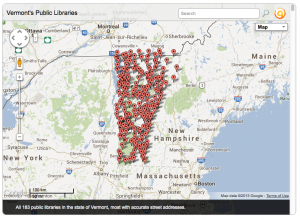Documenting Rural Libraries: Hampshire alum Jessamyn West, Library & Information Activist
 This morning, your Hampshire librarians learned about a cool project through our library-oriented social media channels: Jessamyn West, a Vermont-based librarian-technologist, is traveling around her state, documenting each of its 183 public libraries.
This morning, your Hampshire librarians learned about a cool project through our library-oriented social media channels: Jessamyn West, a Vermont-based librarian-technologist, is traveling around her state, documenting each of its 183 public libraries.
West, a Hampshire alum, is the community technology librarian at the Randolph Technical Career Center (RTCC). She is well-known in library circles for her work as an activist, a longtime blogger, and an author (disclosure: Jessamyn West is one of a small group of librarians whose approach to radical librarianship inspired this author to become a librarian herself). The author of the article about West’s project (linked above) notes that “she is director of operations for the community weblog MetaFilter (…); the founder of Librarian.net, one of the first and most comprehensive library-related blogs; a popular speaker, teacher and anticensorship warrior; and a justice of the peace. Inasmuch as librarians may be described as “famous,” West has earned that descriptor.”
The article continues with a terrific summary of West’s work as an advocate, activist and educator:
Above all, West values libraries because they are committed to providing access to information and knowledge. And access is a topic about which she is well informed and passionate. She’s written a book, Without a Net: Librarians Bridging the Digital Divide, that addresses the challenges of delivering widespread access to information technology. That problem can be especially acute in Vermont, where many rural areas have very slow internet access or none at all.
West comes armed with statistics from the Vermont Department of Libraries — for example, that 19 of the state’s 183 public libraries lack internet access. Though she says she doesn’t believe that web access is the ultimate goal of a library, West would certainly like to enhance all Vermonters’ access to information.
That’s a task she sees as a primary concern of the modern librarian. “We’re not going to solve the digital divide just by making another website to help people navigate the digital divide,” West says. If a person with zero computer experience is simply plunked down in front of a terminal and told, “‘Sign up for health care,’” she adds, “well, that doesn’t actually solve a problem.”
Libraries stand quietly at the forefront of the response to a number of other challenging issues, not the least of which is privacy. West refers to a recent incident in Randolph in which local police, investigating a crime, requested access to library computers. Insisting that their first responsibility was to the privacy of their patrons, librarians insisted the cops get a warrant. The authorities did so, but a minor controversy arose about the relative values of safety and privacy.
Issues of copyright and digital rights management technologies (designed to limit post-sale access to digital content) get West particularly fired up, especially when, for instance, media companies harass a library for arranging a public showing of a DVD that it legally owns. This is a legal gray area, and West says it frustrates her immensely, but she understands why some libraries don’t try to push the envelope. “For a public servant, breaking the law — even a stupid law — is a path that’s fraught with peril,” says West, who favors what she calls “reasonable copyright.”
For these and other opinions, West is regarded within the library world as a bit of a rabble-rouser. She’s no great fan of the American Library Association, an organization she’s taken to task for what she sees as its inadequate grasp of digital technology. West has also attracted attention for her efforts to fight the USA PATRIOT Act.
Giant library organizations may not be West’s biggest fans, but local librarians adore her almost as much as she adores them. At RTCC, West leads a variety of computer classes for students of all experience levels. Ruth Durkee, West’s supervisor and the assistant director of adult education at RTCC, describes her classes as “hugely popular.” Durkee says of West, “She will not be quiet if she sees something that she thinks libraries should be doing that they aren’t doing.”
West recently wrote about the mapping work she did for her Vermont public library project on her blog. We’re hoping she’ll keep posting updates about her library visits and her process for gathering and sharing the information she collects along the way.
